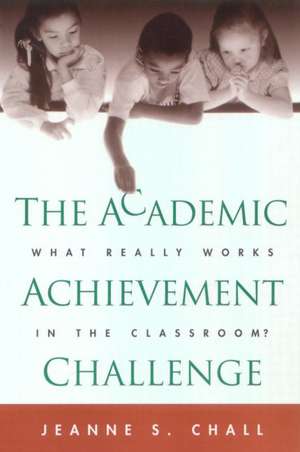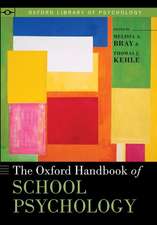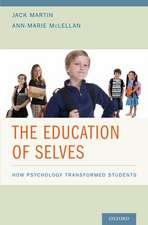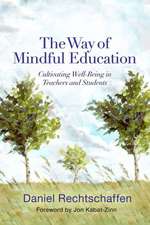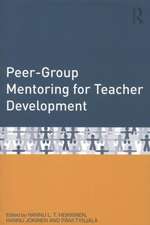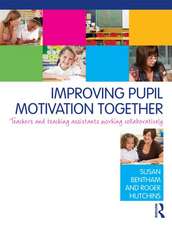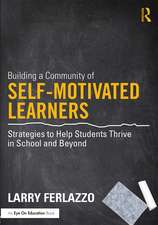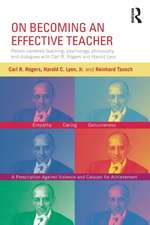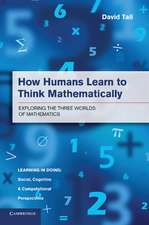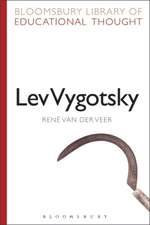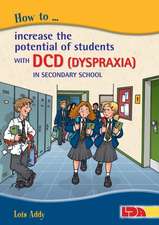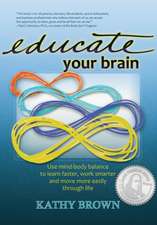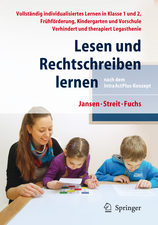The Academic Achievement Challenge: What Really Works in the Classroom?
Autor Jeanne S. Challen Limba Engleză Paperback – 16 mai 2002
This volume addresses one of the central issues in education: how best to instruct our students. From the late Jeanne S. Chall, Professor of Education at Harvard University and a leading figure in American education, the book reviews and evaluates the many educational reforms and innovations that have been proposed and employed over the past century. Systematically analyzing a vast body of qualitative and quantitative research, Chall compares achievement rates that result from traditional, teacher-centered approaches with those resulting from progressive, student-centered methods. Her findings are striking and clear: that teacher-centered approaches result in higher achievement overall, with particular benefits for children of lower socioeconomic status and those with learning difficulties. Offering cogent recommendations for practice, the book makes a strong case for basing future education reforms and innovations on a solid empirical foundation. In a new foreword to the paperback edition, Marilyn Jager Adams reflects on Chall's deep-rooted commitment to and enduring legacy in educating America's children.
Preț: 252.77 lei
Nou
Puncte Express: 379
Preț estimativ în valută:
48.37€ • 50.20$ • 40.43£
48.37€ • 50.20$ • 40.43£
Carte tipărită la comandă
Livrare economică 17-31 martie
Preluare comenzi: 021 569.72.76
Specificații
ISBN-13: 9781572307681
ISBN-10: 1572307684
Pagini: 210
Dimensiuni: 152 x 229 x 17 mm
Greutate: 0.34 kg
Ediția:Revised
Editura: Guilford Publications
Colecția Guilford Press
ISBN-10: 1572307684
Pagini: 210
Dimensiuni: 152 x 229 x 17 mm
Greutate: 0.34 kg
Ediția:Revised
Editura: Guilford Publications
Colecția Guilford Press
Public țintă
Professional and Professional Practice & DevelopmentCuprins
Contents
1. Academic Achievement: An American Dilemma
2. Traditional, Teacher-Centered Education versus Progressive, Student-Centered Education
3. Twentieth-Century Trends in Educational Policy: The Shift toward Student-Centered Programs
4. Trends in Specific Areas of the Curriculum: Reading, Mathematics, Science, and Social Studies, 1900 to the 1990s
5. Research on the Overall Effects of Teacher- and Student-Centered Educational Programs
6. Descriptive Studies of Early Educational Experiments
7. Student-Centered Education: From Theory to Practice
8. Socioeconomic and Learning Difference Effects
9. Parents, the Media, and other Nonschool Educators
10. Where Do We Go from Here? Conclusions and Recommendations
Appendix: Key Differences between Teacher-Centered and Student-Centered Instruction
1. Academic Achievement: An American Dilemma
2. Traditional, Teacher-Centered Education versus Progressive, Student-Centered Education
3. Twentieth-Century Trends in Educational Policy: The Shift toward Student-Centered Programs
4. Trends in Specific Areas of the Curriculum: Reading, Mathematics, Science, and Social Studies, 1900 to the 1990s
5. Research on the Overall Effects of Teacher- and Student-Centered Educational Programs
6. Descriptive Studies of Early Educational Experiments
7. Student-Centered Education: From Theory to Practice
8. Socioeconomic and Learning Difference Effects
9. Parents, the Media, and other Nonschool Educators
10. Where Do We Go from Here? Conclusions and Recommendations
Appendix: Key Differences between Teacher-Centered and Student-Centered Instruction
Notă biografică
Jeanne S. Chall, PhD, was Emeritus Professor of Education at Harvard University Graduate School of Education until her death in 1999. She founded and directed the Harvard Reading Laboratory. Her books include Learning to Read: The Great Debate, Stages of Reading Development, Readability Revisited and the New Dale-Chall Readability Formula, and Qualitative Assessment of Text Difficulty. A member of the National Academy of Education and the Reading Hall of Fame, Dr. Chall served on the Board of Directors of the International Reading Association and the National Society for the Study of Education. She received many awards, including the American Psychological Association's Edward L. Thorndike Award for distinguished psychological contributions to education, the American Educational Research Association Award, the International Reading Association Citation of Merit, and the Samuel T. Orton Award from the Orton Dyslexia Society.
Recenzii
"For school psychologists, this book provides: (a) a useful overview of the history of key ideas which continue to affect what we do in schools today, and (b) and overview of the empirical research on the comparative effectiveness of student-centered and teacher-centered approaches to education. For teachers who are less exposed to the current empirical literature in education, this book is perhaps an even more valuable resource. The teacher training curriculum in most schools of education do not teach how to conduct, evaluate, or employ research findings to improve classroom instruction....Chall provides a clear presentation of the relevant research that relates to improving achievement and the historical context in which certain beliefs, independent of supporting research, gained ascendancy over empirically supported practices....Chall has made a strong case for the effectiveness of teacher centered approaches to educational practice as compared to student centered approaches....For school psychologists, teachers, administrators, and parents this book can provide a clear answer to the question, 'What works in the classroom?'. The next step is to do it."--School Psychology Quarterly
"Offering cogent recommendations for practice, the book makes a strong case for basing future education reforms and innovations on a solid empirical foundation....The value of a more formal, teacher-centered education is thoroughly demonstrated, with particular attention given to the benefits derived by children of lower socioeconomic status and those with learning difficulties....The book points us towards solutions based on knowledge and past experience, rather than fads and expediency." --ZDM - Zentralblatt Für Didaktik Der Mathematik
"Chall wants teachers to tap the entire spectrum of education ideas to draw on a wide range of classroom practices regardless of their ideological points of origin. In the end, this call for open-mindedness may be her most important legacy."--Teacher Magazine
"How best to instruct students is the central theme of the late Jeanne S. Chall's last book....The ten chapters focus on all aspects of the issue including thorough discussions of traditional, teacher-centered education versus progressive, student-centered education trends in reading, mathematics, science, and social studies, and conclusions and recommendations. An appendix shows the key differences between the two strategies in a clear, concise manner. Highly recommended at all levels."--Choice
"It would create a revolution in American education if every teacher, parent, and school board member were to read this book. What a wonderful, informative, readable, commonsense discussion of what works in classrooms and what usually doesn't work."--Diane Ravitch, author of The Troubled Crusade; Research Professor, New York University; Former U.S. Assistant Secretary of Education for Research and Improvement
"The capstone work of a great scholar, this book synthesizes all the relevant research to show that student-centered teaching does not live up to its education-school billing. Rather, it is teacher-centered education which leads to greater excellence and fairness. For the sake of our children, we must not wait decades, as we did with reading, before heeding the truths uncovered by the matchless scholarship of Jeanne Chall."--E.D. Hirsch, Jr, Ph.D., University Professor of Education and Humanities, University of Virginia
"In her last book, Jeanne Chall brings her vast experience with the field of education and her rigorous scholarship to bear on what has become the hottest topic of the day. Expanding her focus from literacy to the full range of curriculum, Chall concludes that the preponderance of evidence supports a strong teacher-centered approach to education over methods that transfer primary responsibility for learning to students. This book may well define the educational debates of the next decade. It provides both a needed historical perspective on educational fads and facts, and an incisive analysis of the forces affecting educational change. As such, The Academic Achievement Challenge ought to be required reading for anyone entering the profession of education today."--Andrew Biemiller, PhD, Professor and Coordinator of MA Teacher Education Program, Institute of Child Study, University of Toronto
"Beyond being a classic study of what works in the classroom and why, Jeanne Chall's final book provides us with an enduring lesson in how to base recommendations for practice on analysis of research."--Mary Beth Curtis, PhD, Center for Special Education, Lesley University
-"Offering cogent recommendations for practice, the book makes a strong case for basing future education reforms and innovations on a solid empirical foundation....The value of a more formal, teacher-centered education is thoroughly demonstrated, with particular attention given to the benefits derived by children of lower socioeconomic status and those with learning difficulties....The book points us towards solutions based on knowledge and past experience, rather than fads and expediency." --ZDM - Zentralblatt Für Didaktik Der Mathematik
"Chall wants teachers to tap the entire spectrum of education ideas to draw on a wide range of classroom practices regardless of their ideological points of origin. In the end, this call for open-mindedness may be her most important legacy."--Teacher Magazine
"How best to instruct students is the central theme of the late Jeanne S. Chall's last book....The ten chapters focus on all aspects of the issue including thorough discussions of traditional, teacher-centered education versus progressive, student-centered education trends in reading, mathematics, science, and social studies, and conclusions and recommendations. An appendix shows the key differences between the two strategies in a clear, concise manner. Highly recommended at all levels."--Choice
"It would create a revolution in American education if every teacher, parent, and school board member were to read this book. What a wonderful, informative, readable, commonsense discussion of what works in classrooms and what usually doesn't work."--Diane Ravitch, author of The Troubled Crusade; Research Professor, New York University; Former U.S. Assistant Secretary of Education for Research and Improvement
"The capstone work of a great scholar, this book synthesizes all the relevant research to show that student-centered teaching does not live up to its education-school billing. Rather, it is teacher-centered education which leads to greater excellence and fairness. For the sake of our children, we must not wait decades, as we did with reading, before heeding the truths uncovered by the matchless scholarship of Jeanne Chall."--E.D. Hirsch, Jr, Ph.D., University Professor of Education and Humanities, University of Virginia
"In her last book, Jeanne Chall brings her vast experience with the field of education and her rigorous scholarship to bear on what has become the hottest topic of the day. Expanding her focus from literacy to the full range of curriculum, Chall concludes that the preponderance of evidence supports a strong teacher-centered approach to education over methods that transfer primary responsibility for learning to students. This book may well define the educational debates of the next decade. It provides both a needed historical perspective on educational fads and facts, and an incisive analysis of the forces affecting educational change. As such, The Academic Achievement Challenge ought to be required reading for anyone entering the profession of education today."--Andrew Biemiller, PhD, Professor and Coordinator of MA Teacher Education Program, Institute of Child Study, University of Toronto
"Beyond being a classic study of what works in the classroom and why, Jeanne Chall's final book provides us with an enduring lesson in how to base recommendations for practice on analysis of research."--Mary Beth Curtis, PhD, Center for Special Education, Lesley University
A notable education book of 2000....If a school district could choose one person over the past generation to offer advice on educational strategies, the smart money would be on the late Jeanne Chall....This book is a must for people who work inand runschools.
--American School Board Journal, 3/28/2002ƒƒChall wants teachers to tap the entire spectrum of education ideasto draw on a wide range of classroom practices regardless of their ideological points of origin. In the end, this call for open-mindedness may be her most important legacy.
--Teacher Magazine, 3/28/2002Descriere
This volume addresses one of the central issues in education: how best to instruct our students. From the late Jeanne S. Chall, Professor of Education at Harvard University and a leading figure in American education, the book reviews and evaluates the many educational reforms and innovations that have been proposed and employed over the past century. Systematically analyzing a vast body of qualitative and quantitative research, Chall compares achievement rates that result from traditional, teacher-centered approaches with those resulting from progressive, student-centered methods. Her findings are striking and clear: that teacher-centered approaches result in higher achievement overall, with particular benefits for children of lower socioeconomic status and those with learning difficulties. Offering cogent recommendations for practice, the book makes a strong case for basing future education reforms and innovations on a solid empirical foundation. In a new foreword to the paperback edition, Marilyn Jager Adams reflects on Chall's deep-rooted commitment to and enduring legacy in educating America's children.
